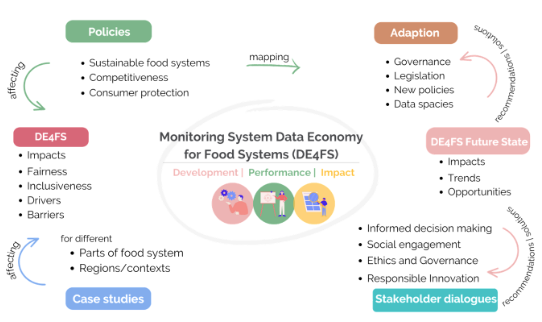The project aims to improve the data economy for food systems by expanding its definition, mapping its development, reiterating the need for a robust monitoring system, and introducing business and governance models stemming from a dialogue with stakeholders.
Big data is a very powerful tool that we have at our disposal, but in order to be put to effective use for the food systems, big data has to be captured, analysed and acted upon. Yet, stakeholders pose a significant question: Can data help us make European food systems more sustainable in social and environmental terms? A new EU project Data4Food2030 responds: yes, it can, if we govern it well and build trust amongst all stakeholders, including marginalised groups whose access to data is limited because of gender, remote/rural geographical location or ethnic background.

Wielding technology to meet our sustainability needs is made easier every day. We can install sensors on everything on the farm and at each step in a food value chain, until it reaches the fork – in other words, acquiring large amounts of data has never been easier. Substantial funding is being directed towards technical science and big data, but more attention needs to be paid to how these affect the society at large, and if those who share their data trust how it is used.
Data-driven innovations today reshape the way we produce, consume, and share food. In doing so, they are transforming our economy and society, and these changes are fast and profound.
“While these changes are promising, the digital transformation of food systems nevertheless entered a twilight zone, which is where we find ourselves today,” said Dr. George Beers, project coordinator at Data4Food2030 at Wageningen Research. “This twilight zone is where food systems, supported by data-driven innovations and data platforms, are expected to transform into a food data economy grounded in data spaces. But whether this happens and how fast, will depend on how effectively social sciences will work alongside technology, because they are closely intertwined.”
There are issues of trust, data ownership, and fear that data can be misused to create monopolistic positions. So far funding has been directed towards advancing and adopting technologies, however the challenge lies not as much in the technology, but rather in the social context. Users may not understand how data is handled and how to trust it. Do we know how to monitor the data economy, who should be doing that and how to organise its governance?
Real-life examples
Stakeholders from nine different EU countries will be part of nine case studies, representing food system related service provision in 27 EU countries, involving 38 core and supporting partners as well as numerous stakeholders – partners, suppliers, consumers.
These nine case studies provide real-life examples of the data economy at micro- and meso-economic level, deploying data and technologies. These examples are studied for mapping and improving the data economy to promote data-enabled business models that are fair and inclusive and broadly cover areas such as food production, supply chain and circular economy.
Each case study poses a specific question to better understand the data space in its context. For instance, available data collected from pig farms will support measuring the impact of sanitary actions and meeting consumer expectations for farmers’ daily management. Another case study looks at Amsterdam’s plan to become fully circular by 2050. In this setting, the key understanding is how to valorise waste stream data to create economic, social and environmental knowledge for stakeholders working to reduce urban food waste.
Future data economy for food systems
Data4Food2030 targets an improved future state of the data economy for food systems from which clear design principles, recommendations and solutions are derived. These will improve and adapt policies and practices at public and private level. As an essential part of the project, stakeholders are deeply engaged to provide input to various data economy concepts and evaluate several project outcomes to increase the impact of the project on the food system.
In this way, Data4Food2030 creates credible pathways towards a fair, inclusive and innovative data economy for food systems — delivering on its motto: discovering the value of data economy in European food systems.